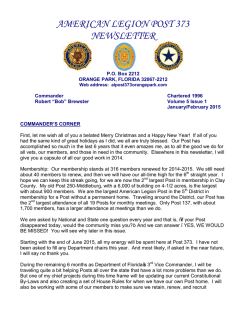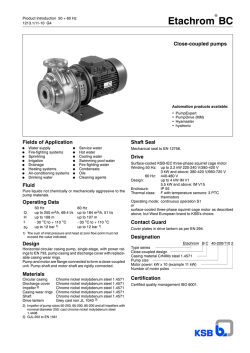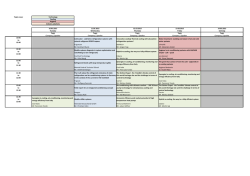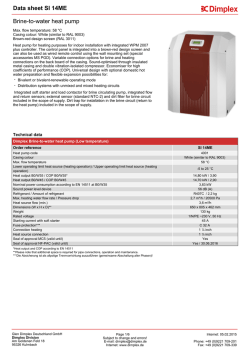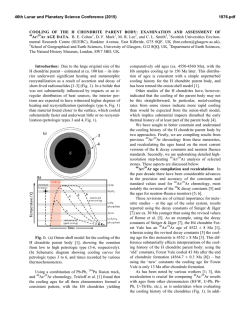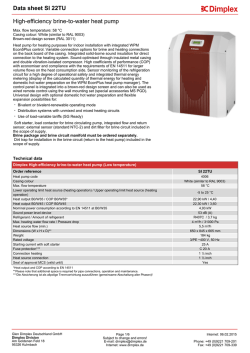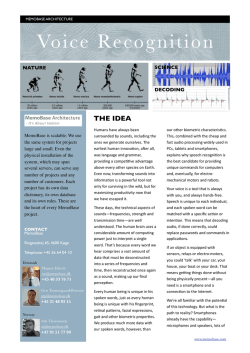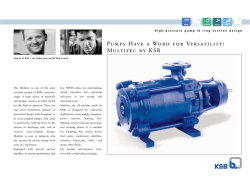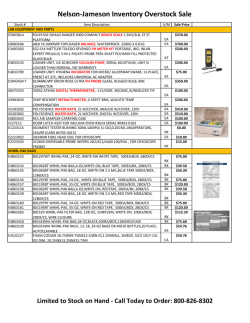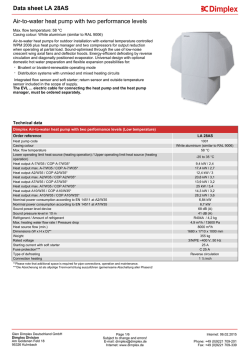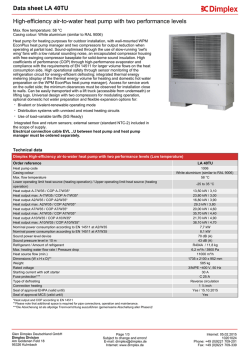
Now Hear This! - Knoxville Power Squadron
Now Hear This! THE NEWSLETTER OF THE KNOXVILLE POWER SQUADRON A Unit of the United States Power Squadrons ® Sail and Power Boating District 17 of the United States Power Squadrons® Vol. 27, No. 2 KPS BRIDGE Commander: Cdr Chuck Smith, P (865) 376-1370 Executive Officer: Lt/C Hank Davis, JN (P/C) (865) 670-3698 Squadron Education Officer: Lt/C Dave Roberts, JN (865) 777-5400 Delila Callahan, Asst. SEO Administrative Officer: Lt/C Catherine Phillips, AP (P/C) (865) 694-4944 Secretary: Lt/C Jean Armes, P (865) 458-9624 Treasurer: Lt/C Tom Dietrich, SN (865) 657-9190 Executive Committee: Current Bridge plus — P/C James Barkley, SN (865) 966-7261 P/D/C Mike Scher, AP (865) 405-5512 P/D/C Ron Lukens, AP (865) 966-2862 Newsletter Editor: Ken Bloomfield, AP (865) 293-2174 February 2015 Commander’s Comments Cdr Chuck Smith, P We certainly have some winter left but there are signs of warmer days ahead. The Holidays are over and the days are getting a little longer. There is a brand new boating season ahead and your Power Squadron is in full swing with activities. This month we have the Change of Watch, new ABC classes, and preparations for the March Boat Show. It’s also time to make plans to attend the District 17 Conference being held at Joe Wheeler State Park, Rogersville, AL in early April. See details on page 3 of this newsletter. Your new bridge officers will be officially sworn in on the 23rd of this month but they are already working hard on the new agenda and calendar of events for 2015. We are very fortunate to have such an enthusiastic and talented group stepping up to lead. And so this will be my last “Comments from the Commander” article in your newsletter. As past commander I will still sit on the executive committee but look forward to (Commander’s Report Continued on page 2) United States Power Squadrons Now Hear This! Our Website is: WWW.KPS-SITE.ORG ELECTED NON-EXECUTIVE COMMITTEES AUDIT: CHAIR: P/C Larry Campbell, AP 2 Year: Paul Dockins, P 3 Year: NOMINATING: CHAIR: Linda Sundstrom 2 Year: Janet Bray, P 3 Year: Cindy Davis, S RULES: CHAIR: P/C Margaret Edidin, P 2 Year: Kirby Wilcher, P 3 Year: PORT CAPTAINS WATTS BAR LAKE: Robert McConnel, S/N FT LOUDOUN LAKE: P/C James C. Barkley, SN TELLICO LAKE: P/D/C Mike Scher, AP APPOINTED COMMITTEE CHAIRS and OFFICERS (Some of the following positions will be updated.) BOAT SHOWS Lt/C Hank Davis, JN (P/C) MEMBERSHIP Ed Armes NATIONAL LIAISON P/D/C Ronald Lukens, AP SAFETY CC Michael P. Scher, AP PUBLIC RELATIONS P/C Nick Tronolone, AP LAW OFFICER P/C Jim Barkley, SN SQUADRON HISTORIAN P/C Nick Tronolone, AP VESSEL SAFETY CHECK P/C Bob Bray, JN PROPERTY OFFICER TBA LEGISLATIVE/LIASION Commander Chuck Smith, P ROSTER Nancy Campbell, P OPERATION BOAT SMART Lt/C Dave Roberts, JN NEWSLETTER Ken Bloomfield, AP WEBMASTER of KPS Website (www.kps-site.org) Ken Bloomfield, AP ASSISTANT ADMINISTRATION Nancy Campbell, P Polly Lanz Charlie Meadows, S P/C Sharon Birdwell, AP ABC CLASS COORDINATOR Lt/C Dave Roberts, JN (Commander’s Report Continued from page 1) working with Mike and the new leadership. It has been a true honor to serve as your commander these past two years. My team of officers has also been tremendous. Thank you for allowing me this privilege. I would encourage each member to find a place to serve and in doing so enrich your membership. Cdr. Chuck Now Hear This! Page 2 Commander’s Report Now Hear This! Commander Chuck Smith, AP Page 3 Administrative Officer Report Lt/C Catherine Phillips, AP (P/C) I wish to express my sincere thanks and appreciation to those, too many to mention, volunteers who with expertise so capably Captained KPS events this past year. Cathy. February 23, 2015 we will be joined by D-17 Education Officer, Tom Hamilton, who will discharge the current Bridge and administer the oath of office to the 2015 Bridge. The Lakeside Tavern will be the location for the Change of Watch. Lakeside Tavern is located at the top of the hill as part of the Concord Marina complex on Northshore Drive. This is not our first event at the Lakeside Tavern where we are always well treated, enjoy social time, the view, and excellent food. Each dinner is served with a salad, a medley of fresh vegetables, and a baked potato to enhance your selection from the following entrees: Hickory-Grilled Sirloin Lakeside Chicken Pasta Blackened Tilapia. All dinners are priced the same, $25.00 per person. We need your paid-in-advance reservation no later than February 18, 2015. Send your selections and check to: Nick Tronolone 11130 Anchorage Circle Knoxville TN 37934 Then be ready to enjoy a totally new adventure with a Greek--Italian theme! We will meet at Pero's on the Hill for the March 23 dinner meeting. The location is: 7706 South Northshore Drive, Knoxville 37919 (stay on Northshore Drive and continue east to the Rocky Hill area). There is ample parking space in the back of the restaurant. Since we will be utilizing the banquet room in the rear of the restaurant, you will find it convenient to enter through the back door of Pero's. More details will be available in the March edition of NHT. Linda/Cathy Now Hear This! Page 4 Education on Deck 1st Lt Delila Callahan, P Education Assistant Officer Advanced Piloting Course Completers Be sure to congratulate Ed and Jean Armes, Bill Brumit, Delila Callahan, Dave and Denise Powers and Chuck Smith. They can now add AP after their names. Each successfully completed the Advanced Piloting course taught by Jim Barkley during October and November. Advanced Piloting is the second in the sequence of USPS courses on navigation. It continues to build coastal and inland navigation skill, allowing the student to take on more challenging conditions – unfamiliar waters, limited visibility, and extended cruises. GPS is embraced as a primary navigation tool while adding radar, chart plotters, and other electronic navigation tools. As with Piloting, the course includes many in-class exercises and homework, extensive cruises that use course planning, dead reckoning, accounting for tides, currents and time changes in the regions. A grade of 80% is required to pass the course and our seven students all scored in the 90s. Three ABC courses are scheduled for: 1. Feb. 3,5,10 and 12 at Gander Mountain from 6-8 pm, 2. Feb. 21, 22 and 28 at Tellico Harbor Clubhouse and 3. At Caney Creek on March 17,19,24, and 26 from 6-8 pm. Course cost is $37 per student and for young people who require testing for licenses, there’s an additional cost of $10 for the TWRA test. Contact Otto Schwarz at 865 927-3962 for registration or further information. The Weather Course: Will begin March 11 at Gander Mountain, 6-8 p.m. and will run for five weeks. It will be taught by Dave Powers, a private pilot who was an air traffic controller in Memphis for twenty-five years and now lives aboard his boat with wife Denise at Tellico Marina. (Education Report Continued on page 6) Now Hear This! Page 5 Education Awards Tom Dietrich, SN (Education Report Continued from page 5) The cost of the course is $73 dollars for each individual student and $109 for a couple who share materials. Materials include a USPS Weather Manual textbook with full color photos; a set of three Daily Weather Maps; and NOAA’s Sky Watcher Chart – a reference to assist in identifying cloud types. The safety and comfort of those who venture out-on-the water have always been weather dependent. In this course students will become keener observers of the weather, but weather observations only have meaning in the context of the basic principles of meteorology — the science of the atmosphere. The course focuses on how weather systems form, behave, move, and interact with one another and reflects the availability of all sorts of weather reports and forecasts on the Internet. This is a general weather course benefiting those sitting in their living rooms, as much as those standing behind the helm. Speak to: Dave Powers at 901 337-3770 or Delila Callahan at 931-456-0505 for further information or to register for this course. Dave can also be reached at [email protected]. Message From Event Organizers Tom & Marbeth Dietrich ! Save the date, April 25 ! This will be our first raft-up and we are going to have a poker run. Look for details in the next edition of NHT. Now Hear This! Page 6 Technical Library Ken Bloomfield, NHT Editor Our typical gasoline engine (i.e. MerCruiser) cooling system is one of the most vital necessities, and often one of the most overlooked. Worn or damaged water pump/impeller, clogged passages, cracked/kinked hoses can easily create an overheat condition, one of the most damaging conditions a motor can face. Overheating can and does cause premature failure due to swelling of pistons and rings in the cylinder bore, warping and/or cracking of cylinder heads, blown cylinder head gaskets, degradation of oil lubricating properties, etc. The cooling system of most marine engines is equipped with a "warning horn". If you hear this warning sound while underway, you must heed the warning and investigate as quickly as safely possible. The overheat sensor is simply a bimetallic switch that grounds a wire when the engine overheats. You should test the function of the warning horn periodically by disconnecting the wire attached to the engine temperature sensor, and with key switch in the "on" position and engine running, directly touch the wire to a good known ground source (i.e. the block). The warning horn should sound off, if not, horn and/or wire needs to be checked or replaced. Fig. 1 — Direct heat exchanged cooling There are two types of cooling systems commonly found on inboard/outboard boat motors. Figure 1 shows a direct heat exchanged cooling system. With this system, seawater (a.k.a. raw-water) is drawn by a belt driven pump from a thru hull fitting in hull of boat on inboards, or by an integrated pump through the lower unit water passages on an inboard/ outboard. This seawater passes directly through the engine with thermostatic mixing control. Fig. 2 — Indirect heat exchanged cooling Figure 2 shows the typical “indirect” heat exchanger cooling system. This configuration utilizes contained antifreeze in the main part of the motor and also uses a heat exchanger to cool the antifreeze. The block is cooled by the antifreeze. Figure 3 on the next page shows Now Hear This! Page 7 Technical Library Ken Bloomfield, NHT Editor an inboard seawater pump type that is the heart of the cooling system, and if anything goes wrong here, an overheat problem is inevitable. Pump failures can include worn or damaged impeller, worn or damaged housing, and impeller shaft lock up. Change the impeller at least every two years regardless of usage, or every 500 hours of operation, Fig. 3 — Inboard raw water pump. whichever occurs first. An impeller will be damaged almost instantly from running motor with insufficient water supply, so don’t forget to turn the thru-hull back on! When replacing the impeller, make sure to apply a thin layer of light weight grease to the inner surface of the impeller housing. Damage to the pump housing can be caused from lack of winterization procedures, and/or running motor with insufficient water supply. If the shaft locks up, there is no real way to field service, so the pump must be repaired or replaced as a whole. Figure 4 shows location of water pump located in stern drive. Failures here, are typically the same as in figure 3, except that shaft Fig. 4 — Stern drive lock up does not usually occur. pump. The thermostat is the next possible culprit of an overheating problem in the cooling system. Figure 5 shows the typical thermostat arrangement in the thermostat housing. Most thermostats are designed to begin to open at 160 degrees water temperature. As long as the thermostat opens as designed, everything is fine, if it doesn't then overheating will surely result. To test the thermostat, remove and place in pan of water on cook stove. With a reliable thermometer, heat water until thermostat opens. It should open at approximately 160 degrees. If it does not, discard and replace with new thermostat. raw water Fig. 5 — Thermostat housing. Finally, the third most common reason of an overheat problem with the cooling system can be attributed to clogged water passages, usually in the exhaust manifolds. Since most exhaust manifolds are made of cast iron, rust and corrosion are always present. If you have an overheating problem, and the impeller and thermostat are in good shape, remove the riser from the exhaust manifold Figure 6, and inspect water passages for blockage. Taking care of these components will keep both you and your engine cool ! Now Hear This! Fig. 6 — Water passages. Page 8
© Copyright 2026
